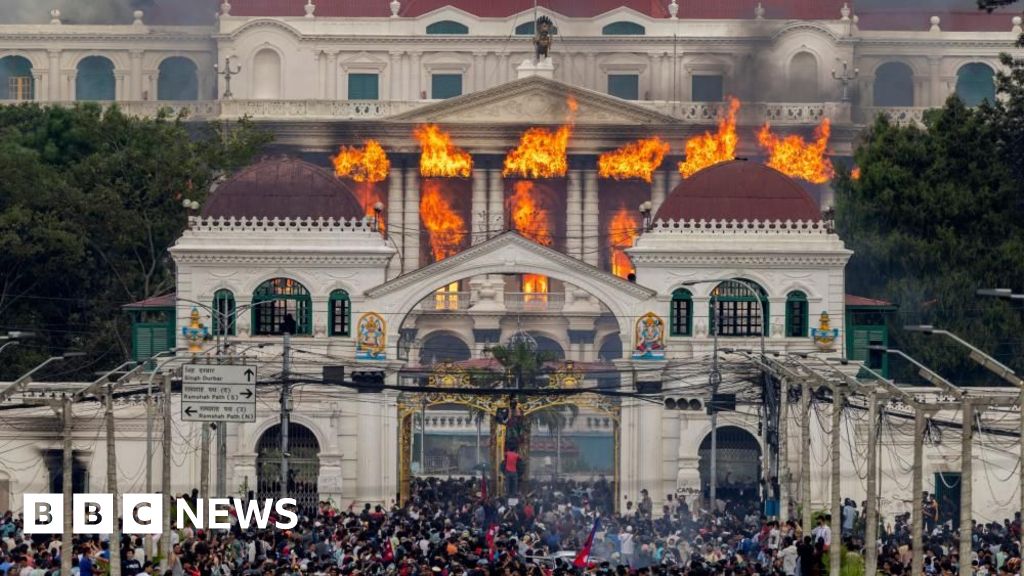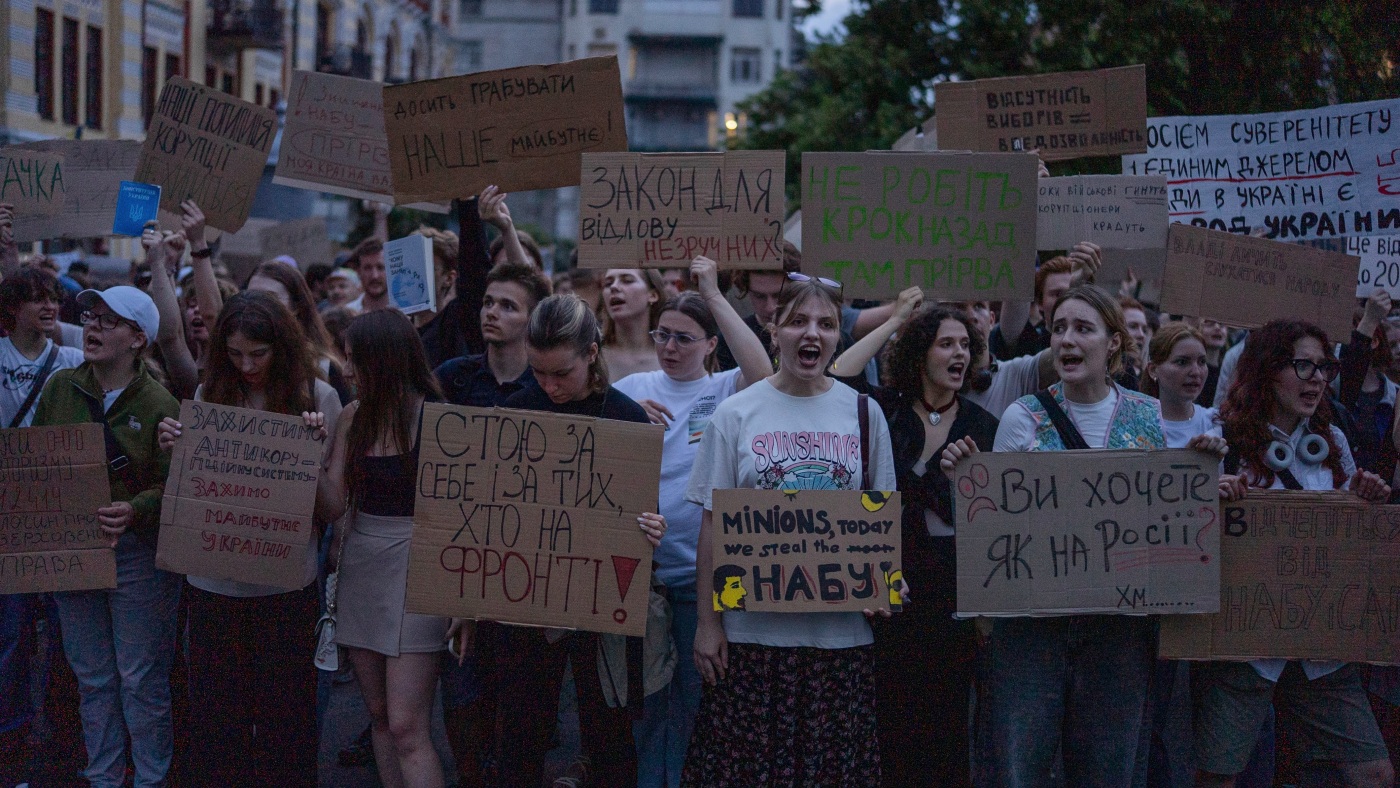Nepal's Political Turmoil: Oli Resigns Amidst Anti-Corruption Protests

Introduction
Nepal's political climate is in turmoil as anti-corruption protests have led to the resignation of Prime Minister KP Sharma Oli. The situation has escalated to the point where the parliament building was set on fire, adding to the already devastating toll of at least 22 reported deaths in clashes.
Key Details
The protests were sparked by Oli's controversial decision to dissolve the parliament and call for early elections, which many saw as an attempt to hold onto power amidst growing corruption allegations. This move has been met with fierce opposition from the opposition parties and the public, resulting in widespread demonstrations and violent clashes with security forces. The situation has only intensified with Oli's resignation, as his party now faces pressure to appoint a new prime minister and address the demands of the protestors.
Impact
The resignation of the prime minister and the escalating unrest in Nepal has significant implications for the country's political stability and economic growth. With the ongoing pandemic and the recent border dispute with India, the current situation only adds to the challenges faced by Nepal. It is crucial for the government to address the demands of the protestors and establish a stable and transparent political system to restore peace and progress in the country.
About the Organizations Mentioned
Parliament
The **Parliament** is a fundamental democratic institution responsible for legislating, overseeing government activities, and representing citizens. It typically consists of elected representatives (such as MPs) who debate and pass laws, scrutinize government actions, and allocate public funds. Modern parliaments increasingly leverage digital technologies to enhance transparency, efficiency, and citizen engagement. Historically, parliamentary systems have evolved from traditional face-to-face deliberations to incorporating comprehensive digital infrastructures. For example, the UK Parliament has embraced ICT by providing MPs with secure email, intranet access, cloud-based productivity software, and tablet devices to replace paper documents, enabling remote work and environmental savings as part of its Digital First strategy[1]. Similarly, the Canadian Parliament expanded its use of ICT during the COVID-19 pandemic, adopting tools like Zoom for hybrid meetings and e-voting apps, along with open data portals and virtual reality experiences to boost public accessibility and engagement[2]. Parliaments worldwide face the challenge of modernizing while preserving valued traditions. Innovation involves digitizing parliamentary information (minutes, debates, bills), implementing secure digital systems for remote participation, electronic voting, and live streaming of sessions[4]. Developing digital skills among parliamentarians and staff is critical to maximize these technologies' benefits[4]. The Global Centre for ICT in Parliament supports these efforts by facilitating knowledge exchange and technical assistance globally[5]. Key achievements in parliamentary innovation include the integration of AI tools for legislative analysis, enhanced transparency through open data, and improved citizen engagement platforms[3][7]. In 2025, some legislatures, such as the House of Representatives, established specialized committees focused on AI and information technology policy, reflecting a growing recognition of digital transformation’s strategic importance[7]. Currently, parliaments are undergoing broad digital transformations, re-mapping technological landscapes to meet future business needs, improve legislative processes, and strengthen democratic institutions worldwide[6]. This ongoing evolution blends tradition with innovation to create more accessible, transparent, and effective legislatures for the
World Health Organization
The World Health Organization (WHO) is a specialized agency of the United Nations, established in 1948, with a mandate to promote global health, coordinate international responses to public health threats, and set standards for health policies and interventions[2]. Headquartered in Geneva, Switzerland, WHO operates in over 150 countries, working with governments, NGOs, and other partners to advance health equity, strengthen health systems, and respond to health emergencies. ## What WHO Does WHO’s core activities include monitoring global health trends, setting international health standards, providing technical assistance to countries, and serving as a forum for scientific and policy discussions on health issues[2]. The organization publishes influential reports such as the annual **World Health Statistics**, which tracks progress toward Sustainable Development Goals (SDGs) and provides a global “health report card”[1][8]. WHO also maintains the Model List of Essential Medicines, guiding countries on which drugs are most critical for public health[7]. In addition, WHO leads global campaigns on issues ranging from infectious disease eradication to noncommunicable diseases (NCDs), maternal and child health, and health emergencies[2][6]. ## History and Key Achievements WHO’s history is marked by landmark achievements, including the eradication of smallpox, near-eradication of polio, and the development of an Ebola vaccine[2]. The organization played a pivotal role in responding to the COVID-19 pandemic, coordinating global research, vaccine distribution, and public health guidance. In May 2025, WHO member states adopted the world’s first **Pandemic Agreement**, a historic step to improve international coordination and equity in future health crises[4]. WHO also spearheads initiatives like the Triple Billion Targets (healthier lives, universal health coverage, and protection from health emergencies) and technical policy packages targeting tobacco, alcohol, salt, and trans fat reduction[1][2]. ## Current Status and Notable Aspects WHO is currently implementing its **Fou
OpenAI
OpenAI is a leading artificial intelligence research and deployment company founded in 2015 with the mission to ensure that artificial general intelligence (AGI)—AI systems generally smarter than humans—benefits all of humanity[1][2]. Initially established as a nonprofit, OpenAI’s goal has always been to advance safe and broadly beneficial AI technologies. In 2019, OpenAI created a for-profit subsidiary to scale its research and deployment efforts while keeping mission-aligned governance. As of October 2025, this structure evolved into the OpenAI Foundation (nonprofit) governing the OpenAI Group, a public benefit corporation (PBC). This unique corporate form legally binds OpenAI Group to prioritize its mission alongside commercial success, ensuring broader stakeholder interests are considered[1]. The Foundation holds equity in the Group, aligning incentives for long-term impact and growth. Microsoft owns approximately 27% of OpenAI Group, with employees and investors holding the rest[1]. OpenAI is renowned for pioneering breakthroughs in large language models and AI applications. Its products like ChatGPT revolutionized human-computer interaction by enabling natural language conversations and task automation. OpenAI continuously innovates by integrating AI into business tools—for example, its recent launch of “company knowledge” in ChatGPT Business harnesses AI to aggregate and analyze internal company data from apps like Slack, Google Drive, and GitHub, enhancing workplace productivity and decision-making[3]. Key achievements include advancing AI safety research, reducing hallucinations in language models, and expanding AI’s accessibility through products like Codex and ChatGPT Atlas (a browser with ChatGPT integration)[2]. OpenAI’s balanced governance model and cutting-edge research position it uniquely at the intersection of technology innovation and ethical AI development, making it a focal point in business and technology news globally.














